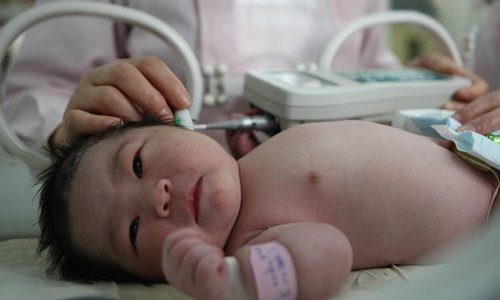China launches campaign to reduce birth defects

A nurse at the People’s Hospital in Huaibei, East China’s Anhui Province, screens a newborn for hearing. Photo: VCG
China has vowed to reduce the occurrence of birth defects amid the implementation of the two-child policy and the high rate of birth defects to ensure population growth in a high quality manner.
Just before China's Birth Defect Prevention Day which falls on September 12, a road-trip education program was launched in Beijing on Friday aimed at highlighting birth defect prevention.
Themed "Infinite Future - Well-prepared Birth," the campaign is headed by the China Medical Education Association (CMEA) and the WHO Collaborating Center for Children's Health and Environment under the guidance of the China Population Communication Center (CPCC).
It aimed to prevent birth defects by spreading knowledge and advocating prenatal eugenic check-ups and folic acid supplementation during pregnancy, said Wang Zhen, a senior CMEA official, at the launch of the program.
Severe challenges
Birth defects are a major cause of infant mortality in their first years, according to Wang Shaowei, director of the obstetrics department of Beijing Hospital.
In China, major birth defects include congenital heart disease, polydactylism, congenital hydrocephalus, and neutral tube defects, Wang Shaowei said.
He believes many factors cause birth defects, including viruses, drugs, genetic factors and micronutrient deficiency, while nutrition deficiency during pregnancy severely affects mothers' health and children's healthy development.
Folic acid deficiency contributes to most CHD cases and neutral tube defects to children, and cause placental abruption and pregnancy hypertension to mothers.
Dai Yaohua, director of the WHO Collaborating Center for Children's Health and Environment, told the Global Times that the WHO customizes nutrition formulations for children and women by country and region, and the government provides financial support and implements plans.
Multiple projects have been launched to provide free nutritional packages that contain vitamins and micro nutrients to children on a daily basis in poverty-stricken areas in China, according to Dai.
Han Hui, a deputy director of the maternal and child health center of the Chinese Center for Disease Control and Prevention, said a working mechanism with the efforts of government, society and families has been formed in China, with the infant mortality rate expected to be reduced to five per thousand by 2030.
Han said China has established a three-tier birth-defect prevention program in which first-tier measures are aimed at reinforcing education on birth defect prevention. The second is to reduce the occurrence of birth defects, and the third tier is to improve the lives of children with defects.
The latest report on women's and children's health of the Chinese National Health Commission in May shows that China has made remarkable achievements in terms of lowering the child mortality rate, as the rate for children under 5 years old dropped from 3.5 per thousand to 1.6 per thousand in 2017.
Low awareness
"China has been monitoring people's health literacy since 2008," Shi Qi, deputy director of CPCC, told the Global Times. "Health literacy refers to the health knowledge mastered by the people and people's ability of using the knowledge to stay healthy," Shi explained.
The National Health Commission said the health literacy of Chinese people has remained at 17 percent, and the level of those aware of birth defects is not high, although there is no detailed data, said Shi, who participated in the survey.
With a growing number of Chinese families paying more attention to the health of the next generation, they still have no access to systematic health training but learn about maternal and child health care on their own, said Shi.
Dai suggests that education on maternal and child health care be carried out in school. "Pictures of defective babies should show teenagers that unhealthy habits and nutrition deficiency could lead to birth defects and neonatal deformity," Dai told the Global Times.
Newspaper headline: Protecting the future